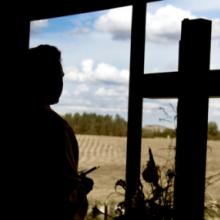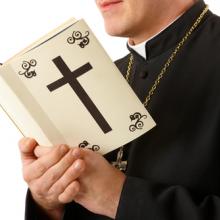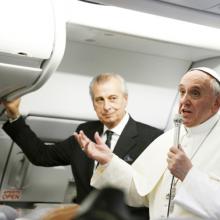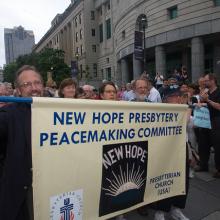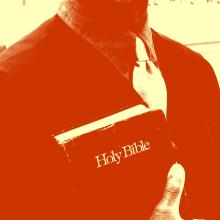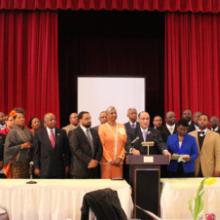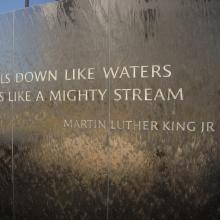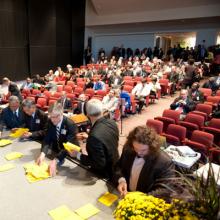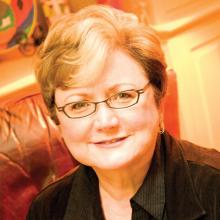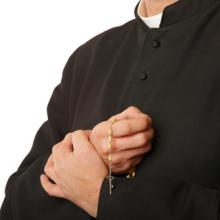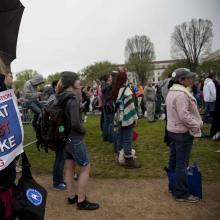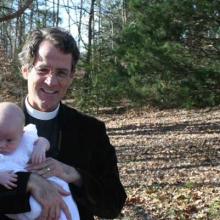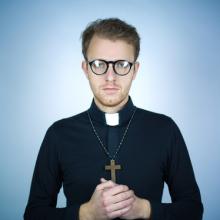Clergy
Clergy used to rank near the top in polls asking Americans to rate the honesty and ethics of people in various professions. This year, for the first time since Gallup began asking the question in 1977, fewer than half of those polled said clergy have “high” or “very high” moral standards.
But opinions on clergy differed markedly by party, with Republicans viewing them far more favorably than Democrats.
Overall, 47 percent of respondents to the survey gave clergy “high” or “very high” ratings, a sharp drop in confidence from the 67 percent of Americans who viewed them this way in 1985.
Microsoft CEO Steve Ballmer’s surprise decision to retire does more than throw the technology industry into a frenzy of speculation. It raises the problem of succession.
From major corporations to startups led by visionary leaders, from universities to churches, the departure of the top leader can stop momentum and usher in months, perhaps years, of uncertainty.
Even though dealing with succession is a primary task for a board of directors — some say it’s their preeminent task — relatively few boards take the assignment seriously. They focus instead on the easier work of jousting with the top leader and shilling for institutional investors.
What should be an orderly process of preparing for leadership transition instead becomes a lurching from one standalone regime to the next.
Many board members want the rush of being co-managers of the institution. This is especially true in churches, where boards enjoy making day-to-day decisions about operations. Since a strong central leader would get in their way, many church councils discourage strong clergy and reward compliant permission seekers.
The federal government wants to give Annie Laurie Gaylor a tax break for leading the Freedom from Religion Foundation.
But Gaylor, an outspoken atheist from Madison, Wisc., wants to stop them — and she’s asking a federal judge for help.
The standoff is the latest twist in a court battle over the parsonage exemption for clergy, a tax break that allows “ministers of the gospel” to claim part of their salary as a tax-free housing allowance.
With his open and easygoing manner, Pope Francis charmed the media as much as the faithful during his successful visit to Brazil, the first international pilgrimage of his pontificate.
But it was the pope’s remarks about gay priests, made during a free-wheeling press conference on the return trip to Rome, that drew the most headlines, raising questions about whether the pontiff was signaling a change in the church’s approach to this volatile issue.
When asked by reporters about rumors of a “gay lobby” of clergy in the Vatican who were exposing the Holy See to blackmail schemes and scandal, Francis at first joked that while there’s a lot of talk about such a lobby, “I have yet to find on a Vatican identity card the word ‘gay.’”
Then, in a more serious vein, he added:
“I think that when we encounter a gay person, we must make the distinction between the fact of a person being gay and the fact of a lobby, because lobbies are not good. … If a person is gay and seeks the Lord and has good will, who am I to judge that person?”
Since state legislators were taken over by the Koch brothers, many progressive clergy have spent our entire discretionary accounts on travel to our state capitals. We attend on behalf of equal marriage, the living wage, campaign finance reform, fracking, or low wage workers. While trying to be faithful, we are, also, in the great words of Joseph Sittler, “macerated” by our citizen involvements.
But an experiment is occurring in North Carolina to de-macerate and reunite our spiritual souls with our political bodies. Instead of episodic lobbying, on Moral Mondays, clergy visit with their representatives as chaplains. They change the language from the pragmatics of the political to the hope of our God. They pass through the wilderness of the secular and its optimism and arrive at the land of hope. They talk about the downtrodden in meaningful ways with state legislators.
Most of us are too familiar with this story: an Upper Midwestern Baptist minister claims that “God made Christianity to have a masculine feel [and] ordained for the church a masculine ministry.” Or a Reformed Christian pastor mocks the appointment of the first female head of the Episcopal Church, comparing her to a “fluffy baby bunny rabbit.” Or a Southern Baptist megachurch pastor in California says physical abuse by one’s spouse is not a reason for divorce. Or numerous young evangelical ministers brag about their hot wives in tight leather pants.
Fewer of us are familiar with this story: Tamar is raped by her half-brother Amnon. Tamar protests her brother’s advances, citing the social code of Israel, his reputation, and her shame, to no avail. Their brother Absalom commands her to keep quiet, and their father, the great King David, turns a blind eye.
What do these contemporary statements above, delivered into cultural megaphones with conviction and certainty, have to do with the Old Testament rape and silencing of Tamar? The difficult answer is, quite a lot. The narrative dominance of these stories rests on power and control, which — whether intentional or not — speaks volumes about whom the church serves and what the church values.
WASHINGTON — Black clergy have launched a new coalition to fight gun violence, saying they are undeterred by the recent failure of legislation on Capitol Hill and all too aware of the problem of gun violence.
At meetings held Tuesday in Washington and Los Angeles, supporters of the African-American Church Gun Control Coalition called gun violence “both a sin and a public health crisis” and committed to a three-year action plan of advocacy, education and legislative responses.
“As people of God and as faithful members we have the obligation to stir the world’s conscience and to call on our nation’s decision makers to do what is just and right,” said the Rev. Carroll Baltimore, president of the Progressive National Baptist Convention, which convened the coalition.
For many pastors of urban congregations, “stepping up” to end gun violence stems from a very personal place — as they have been forced to bury their own neighbors and church members. According to Samuel Rodriguez, gun violence – especially in urban areas – deeply affects interfaith leaders there, who are declaring violence-free zones and taking action.
Faith-based leaders in Philadelphia and Chicago have rallied to fight gun violence. Heeding God’s Call, based in Philadelphia, holds prayer vigils at the locations of gun homicides as well as organizes gun-store campaigns that ask gun store owners to sign a code of conduct.
In Chicago, All Saints Episcopal Church organized CROSSwalk, a walk through downtown Chicago, which drew a few thousand people the past two years. Violence on Chicago streets has killed more than 800 young people in the last six years.
Nuenke addressed breaking the chain of violence and pain that we see in every community. He quoted 2 Corinthians 1:3-4 and Isaiah 61 as examples of God’s compassion and its life-changing, healing power.
“What would happen if the body of Christ more fully was involved in living out Christ’s compassion in a broken world?” Nuenke asked. “Sometimes people who are hurt or experience violence end up hurting other people. The care and compassion they might receive from the Lord Jesus will impact them more in 20-30 years than anything else.”
On Good Friday 1963, Martin Luther King Jr. led a nonviolent march through the streets of Birmingham, Ala., to draw attention to the injustices of segregation. Arrested for marching without a permit, King composed “Letter from Birmingham Jail” in response to eight white ministers who criticized the timing of the civil rights demonstrations. Rebuking the clergymen for not taking a bolder stance against segregation, King declared that “Justice too long delayed is justice denied.”
In January 2011, members of Christian Churches Together in the U.S.A. met in Birmingham, Ala., to examine issues of domestic poverty and racism through the lens of the civil rights movement and by reading together Martin Luther King Jr.'s "Letter from Birmingham Jail." As they gathered in the 16th Street Baptist Church under the beautiful Wales Window portraying the black Christ, which replaced the window blown out when the church was bombed in 1963, these contemporary church leaders, representing the broadest Christian fellowship in the country—36 national communions and seven national organizations, including Sojourners—realized that apparently no clergy had ever issued a response to King's famous letter, even though it was specifically addressed to "fellow clergymen [sic]." In 2013, to mark the 50th anniversary of King's letter, Christian Churches Together released its thoughtful response, which we excerpt below. —The Editors
WE CONFESS. As leaders of churches claimed by more than 100 million Americans; as Catholics, evangelicals, Pentecostals, Orthodox, Historic Protestants, and members of Historic Black denominations; as people of many races and cultures: We call ourselves, our institutions, and our members to repentance. We make this confession before God and offer it to all who have endured racism and injustice both within the church and in society.
As church leaders, we confess we have tended to emphasize our responsibility to obey the law while neglecting our equal moral obligation to change laws that are unjust in their substance or application. All too often, the political involvement of Christians has been guided by the pursuit of personal or group advantage rather than a biblically grounded moral compass. We confess it is too easy for those of us who are privileged to counsel others simply to "wait"—or to pass judgment that they deserve no better than what they already have.
We confess that we are slow to listen and give legitimacy to those whose experience of race relations and social privilege in America is different than our own. We keep the "other" at arm's length to avoid hearing the call to sacrifice on their behalf. Our reluctance to embrace our "inescapable network of mutuality" underscores Dr. King's observation that privileged groups seldom give up their advantages voluntarily. For example, it is difficult to persuade most suburban Christians to demand that they strive for the same quality of education in our cities that they take for granted in their own schools. To the extent that we do not listen in love, our influence in society is limited to "a weak, ineffectual voice with an uncertain sound."
A federal court in Indiana has rejected atheists' requests to preside at wedding ceremonies, saying only clergy or public officials are licensed to solemnize marriages.
A lawsuit filed by the Indiana chapter of the Center for Inquiry argued that an Indiana law that requires marriages to be “solemnized” — made official by signing a marriage license — only by clergy, judges, mayors or local government clerks violates the Constitution.
But Judge Sarah Evans Barker of the U.S. District Court for the Southern District of Indiana ruled on Nov. 30 that marriage has religious roots. Therefore, government regulation of marriage is an act of religious accommodation — not endorsement — and protected by the Constitution.
Pollsters and politicians hunting for the rare and elusive undecided voter might want to train their sights on the pulpit.
A whopping 22 percent of Protestant pastors haven’t settled on a presidential candidate, according to a survey released earlier this month by LifeWay Research. By comparison, just 4 percent of all likely voters remain undecided, according to Gallup.
The undecided pastor trend doesn’t appear to be a one-time fluke. A similar survey conducted in October 2008 also found that 22 percent of pastors hadn’t chosen between Obama and then-GOP nominee Sen. John McCain.
The survey of 1,000 Protestant pastors was conducted Sept. 26-Oct. 3 by LifeWay Research, a division of LifeWay Christian Resources, which was founded by the Southern Baptist Convention.
Pursued by politicians, mocked by "Saturday Night Live" and barely tolerated by partisans, undecided voters get a bum rap. But there are good reasons for pastors to remain ambivalent until Election Day, experts said.
Leaders of the Seventh-day Adventist Church on Tuesday said recent decisions by two regional bodies to allow ordained female pastors were "serious mistakes," and women who are ordained won't be recognized — at least for now.
“They directly challenge two world Church decisions on the matter of ordination,” reads a statement, passed by a 264-25 vote during the Annual Council meeting in Silver Spring, Md. “They create doubts about the importance of collective decision-making as a basic feature of denominational life.”
The decisions by the Maryland-based Columbia Union Conference and the California-based Pacific Union Conference came as the worldwide church is in the midst of a broad study of the “theology of ordination” that is expected to be considered at the denomination’s 2015 General Conference Session.
Eileen Guenther, the national president of the American Guild of Organists, reveals behind-the-scenes church struggles in her new book, Rivals or a Team?: Clergy-Musician Relationships in the Twenty-First Century.
Guenther, an associate professor of church music at Washington’s Wesley Theological Seminary and the former organist at Foundry United Methodist Church, talked with Religion News Service about her findings and advice. Some answers have been edited for length and clarity.
Q: You titled your book Rivals or a Team? From your research, which is a better description of most clergy-musician relationships?
A: I would say that rivals may well be the most prevalent, but team is our aspiration.
Q: Why is it so difficult for musicians and ministers to sometimes get along and not have an intense rivalry?
A:. Part of it is lack of understanding of roles. Part of it is control. Each of us is used to kind of being in control in our area, but sometimes if the roles haven’t been clarified, then the control issues become simply that, rather than sorting out, 'OK, who’s going to choose the hymn?' That’s one of the really big issues.
Recently, Keith Anderson, my friend and co-author on Click 2 Save: The Digital Ministry Bible, wrote a post that’s been stirring a good deal of interest — and concern — across the blogosphere.
Anderson’s piece, “What Young Clergy Want You to Know,” has, I suspect, attracted so much attention because it dives right into the middle of the frustration, anxiety, and discouragement one increasingly finds among clergy of all ages and levels of experience, but that is amplified among younger clergy because they’ve made a vocational commitment to the Church at a time when such a choice seems crazier than ever.
This, as Anderson points out in the post, is because younger clergy “understand they are presiding over the death of American Christendom.”
Younger clergy, says Anderson, “are worried about job security — not just about getting paid (which is not always a given) — but whether they can do the job they feel called to do in congregations that don’t want to change.” He continues, “Being prophetic is an attribute we laud in seminary, but it can get you fired in the parish.”
Well, there you have it. The unvarnished truth of vocational experience in institutional contexts that over time wears out even the most patient, most tolerant, most enthusiastic of clergy. The wrenching responses to the post make clear that Anderson struck a nerve among his clergy colleagues.
Most members of the clergy are taught to put the physical and spiritual needs of others first, but that self-denial may be harmful to their own health, according to a new Duke University study.
Studies of United Methodist pastors in North Carolina found high rates of chronic disease and depression, and researchers worry it can be difficult to convince clergy to seek help.
To address these unique problems, Duke Divinity School's Clergy Health Initiative developed a program to provide preventative care in a spiritual context.
How much money does the U.S. government forgo by not taxing religious institutions? According to a University of Tampa professor, perhaps as much as $71 billion a year.
Ryan Cragun, an assistant professor of sociology, and two students examined U.S. tax laws to estimate the total cost of tax exemptions for religious institutions — on property, donations, business enterprises, capital gains and “parsonage allowances,” which permit clergy to deduct housing costs.
Their article appears in the current issue of Free Inquiry magazine, published by the Council for Secular Humanism, an organization of nontheists. U.S. tax law grants religious groups and other nonprofits the exemptions because of their charitable nature.
And while the authors do not claim theirs is a comprehensive or unbiased appraisal, their findings have raised eyebrows in the nontheist community, which has long sought to eliminate the tax exemptions on the grounds that they unfairly favor religious institutions.
The Rev. Tom Sherrod loathed to "declare" a couple man and wife.
As a stutterer, Sherrod always had problems with hard “c” sounds, and the “c” in “declare” was a doozy. “P” sounds weren’t easy either, and the Bible is full of them.
“If I tried to read, I would lock onto words,” said Sherrod, a North Carolina hospital chaplain who is an ordained United Methodist minister. “I tried to steer clear of certain Scriptures.”
Now, after intensive speech therapy, Sherrod publicly reads aloud whatever parts of the liturgy he likes. But before he learned to control the stutter, life -- as it can be for many stutterers -- was an exhausting exercise in avoiding some tough words and muscling through others.
I’ve moved five times in five years of marriage. My husband is a pastor. I am a journalist. He is forever discerning, forever visioning— I am forever antsy.
This latest move to Washington, D.C., led me to think a lot about the “call” to serve. My husband and I were dating, then engaged, then married during his four years at seminary. I suppose I knew what I was getting myself into. (Nope, not one little bit.)
During those years, it was drilled into my brain that even though I felt a “calling” as a writer, a storyteller, etc., it was extremely different from the call.
Read: What your husband is doing is more important than anything you will ever do in your lifetime — ever. Except maybe have his progeny, and then, still, it’s a toss-up.
In light of some recent intense posts - Ultimate Fighting Jesus and Conversation with Rob Bell (re: women in ministry), this list is too funny not to share.
But the brutal fact is that the matter of gender violence isn’t all that funny either. Statistics about gender inequality via UN and UNICEF are even more discouraging.
Regardless where you sit, stand, or wrestle with the issue of women in church leadership, I thought this satirical list was worth sharing for both laughter and even reflection because that’s what good satire forces us to do. And for what it’s worth, I’d encourage you to read some of my thoughts about why I believe women should be included in all levels of church leadership.
